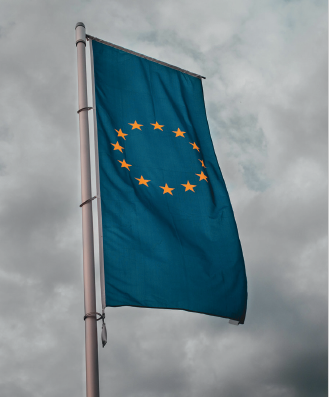[FR] How has the war already changed the European Union?

Has Russia’s invasion of Ukraine radically changed the European Union? In many ways, the war has merely accelerated developments that were already underway in Europe. In 2022, Europeans accelerated the reduction of their dependence on Russian hydrocarbons by drastically limiting natural gas imports and capping the price of oil imports. European institutions also stepped up their use of international sanctions, with nearly ten packages of measures targeting Russian officials; and the Union strengthened its dialogue with its neighbours to increase its influence in the Baltic, Black Sea and Caucasus regions.
But the Union has taken a real turning point in two areas in the wake of the crisis, in other words in a very short space of time: it has drastically changed the content and scope of its geopolitical stance, not only towards Russia but also towards the entire continent; in addition, it has profoundly revised its conception of intra- and extra-European solidarity in an emergency and in record time. The Union of 2023 is no longer the same as that of 2022. The war in Ukraine has led it to change. Rapidly. Profoundly. And perhaps irrevocably.
Externally, the beginnings of a power politics
By January 2021, the European Union had already changed its ‘Russian policy’ in particular and its foreign policy in general. As early as 2014, it had adopted a series of sanctions against the Russian Federation because of its role in the Donbass (Don Basin) conflict and the annexation of Crimea. It had regularly renewed them, thereby exacerbating the economic recession in Russia in 2015 and 2016. It had even implemented regional measures in autumn 2020, imposing similar sanctions (sectoral and individual) on Belarus and the Lukashenko regime due to the insincerity of the presidential election held that year and the massive repression of the opposition. In general, by 2021, the EU had already mastered the tool of sanctions since the ‘2007 guidelines’: across the world, it had already put in place a total of 30 sanctions regimes, either autonomous or decided in the last resort by the United Nations.
Nothing new under the European sun in 2022? Not quite.
The nine waves of sanctions adopted in ten months against Russia in response to the invasion of Ukraine are not just a quantitative leap in the severity of the sanctions and the number of people targeted. These new sanctions constitute a real qualitative revolution in the geopolitics of the Union because they explicitly aim, on the one hand, to change the course of Russian foreign policy and, on the other hand, to establish a balance of power in all areas with the former Russian partner and, finally, to support a third country, Ukraine. The broad spectrum of sanctions is complemented by deliveries of defence equipment to the Ukrainian armed forces. Finally, diplomatic and media support for the Ukrainian executive has been constant, as evidenced by the welcome given to President Zelensky in Brussels on 9 February. This public diplomacy has been carried out by Member States, their governments and civil societies, as well as by the European Parliament, the Presidency of the Commission and the Presidency of the Council.
In response to the war in Ukraine, the EU has shifted from a foreign policy based on influence and attraction to a geopolitics of power relations. Protesting against the violation of international law was no longer enough: the new line is to take action to restore it. This includes the military sphere, as evidenced by Germany’s decision to rearm on a massive scale.
This could be the first step towards a genuine power policy, including in military and capability terms. At the beginning of 2022, the EU was a pole of attraction. By February 2023, it is tending to become a continental power that promotes its interests and principles by all available means.
In a further metamorphosis, the Union’s geopolitics have shifted their centre of gravity: the strategic priority is no longer defined solely by Paris or Berlin in the fight against terrorism stemming from the crises in the Mediterranean and the Middle East. The priority area for the Union’s foreign policy is now its eastern flank: Warsaw, Helsinki and the Baltic capitals were traditionally not very keen on grand geopolitical ambitions. Now, European foreign policy is defined primarily by the eastern risks facing the continent. Suddenly, the Baltic, the Black Sea and the area of the great Ukrainian rivers have become central to the emergence of geopolitical awareness in Europe.
Internally, a renewal of solidarity
The European Union of 2021 was already largely practising policies of solidarity (financial, legal, diplomatic) both internally and externally. It had established itself everywhere as a budgetary driver of economic and social recovery in the face of the consequences of the COVID-19 pandemic. In each Member State, national recovery plans were and still are a tool for solidarity, redistribution and reform of national economies. Without a united Europe, there would be no response to the COVID-19 crisis. Externally, despite the reluctance of the Visegrad Group (V4) Member States, the European Union had already established itself as a reception centre for refugees from Syria in particular, under German impetus. In addition, various cooperation programmes with the eastern part of the continent (Neighbourhood Policy, Eastern Partnership, etc.) aimed to spread European principles and practices in the Caucasus, the Balkans and the Black Sea region.
However, the war in Ukraine has broken down several barriers to intra-European solidarity. The Union has demonstrated its cohesion by adopting new sanctions. But it has also put in place a refugee reception policy that differs from that of 2015. It is now hosting nearly a fifth of the Ukrainian population. Poland’s PiS party is playing a leading role in this reception, even though it led the rebellion against Brussels on the issue. Now, the taboo of welcoming refugees is being discussed everywhere, if not broken.
It has chosen to be much more than a Swiss Confederation on a continental scale. Accepting Ukraine’s almost immediate application for European membership has changed the way the Union relates to its neighbours, whether they come from the USSR (such as Ukraine and Moldova) or the Balkans (such as Albania, North Macedonia and Serbia). Ukraine’s fast-tracked application has given new impetus to the former Balkan applications: the acquis communautaire, which these South-Eastern European states have been patiently digesting for a decade now, has taken a back seat. With the war in Ukraine, the Union has changed its conception of future enlargements: these have become as much gestures of international politics as technical processes. Their geopolitical dimension is equal to their legal content. With these applications, the Union is building its sphere of influence and is no longer content to simply expand its market or its area of legal jurisdiction.
Towards a different Europe?
Certainly, the Europe of February 2023 is a continuation and extension of that of January 2021. Russia’s invasion of Ukraine has not changed Europe’s DNA, its preference for international law over armed coercion, its priority given to stability over expansion, its seriousness regarding the acquis communautaire, etc. But a year of crisis in Ukraine has brought about much more than a change in geopolitical awareness. It has also prompted the Union to take action to define its own security conditions. Between a Russia that will remain hostile for a long time to come, whether victorious or not, and a NATO that has been permanently revitalised due to the high intensity of the conflict, the Union must now rise to the challenge of becoming an autonomous power in all areas.




